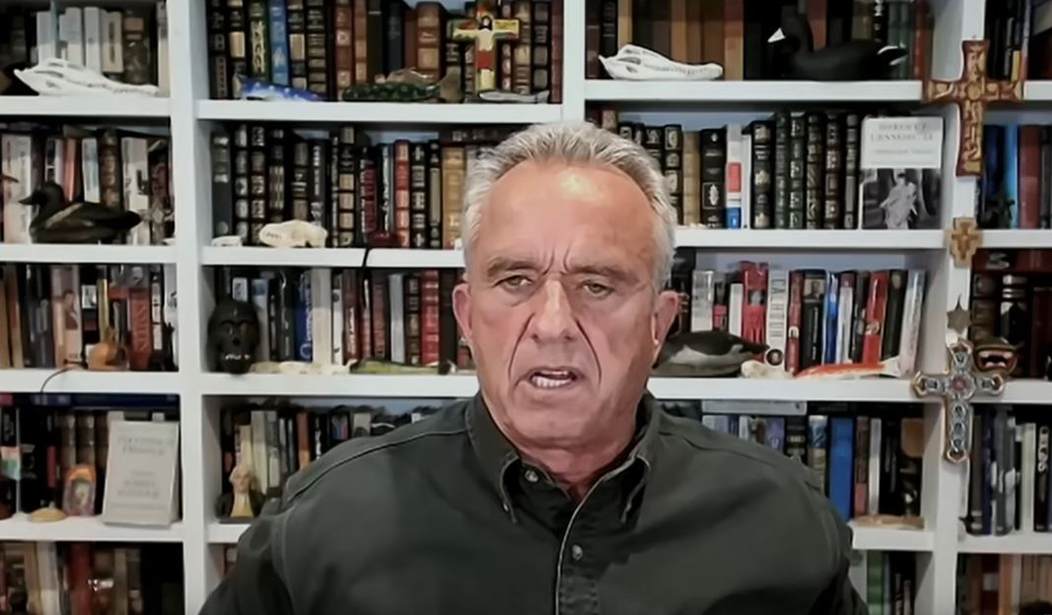In a recent interview with the Forbes Newsroom, Forbes Assistant Managing Editor Diane Brady interviews Democratic Presidential candidate Robert F. Kennedy Jr., who had some sharp things to say about the Democrat Party's primary process, in addition to laying out his thoughts on economics, the environment, and other issues.
Listen carefully about 45 seconds into that interview, with Ms. Brady's question:
...as we head into primary season, what do you make of the DNC calendar?
Mr. Kennedy replies:
Well, I think it's pretty clear that the DNC does not want a primary, they, uh, I don't want to say that they want a coronation, but that's, I think that's a fair way to put it, actually. They're doing, (unintelligible) essentially they're fixing the process, so that it makes it almost impossible to have democracy function, and, uh, they're effectively disenfranchising the Democratic voters from, um, from having any choice, in who becomes President, in who becomes the Democratic nominee. So, two of the things they've done, today, is they've moved the, uh, Iowa primary, they've made rules that if anybody campaigns in Iowa or sets foot, any candidate sets foot in the state of Iowa or sets foot in the state of New Hampshire, then none of the votes that are cast for that candidate will be tallied. In other words, any delegate that I win in New Hampshire or Iowa would go instead to the President. And now they're trying to change it so that if I campaign in New Hampshire that none of the votes cast for me in Georgia will count, and that's significant because it's hard to win the nomination without Georgia.
This doesn't seem very, well, democratic. But the DNC's process (superdelegates?) has never been really democratic. It does, however, strongly favor incumbents and Party favorites.
In response to Ms. Brady asking about the logic behind this change, Mr. Kennedy replies:
Well, they're rigging it so that it, you know, effectively, we're looking at the tabulations now, look like I, if you add up all the superdelegates they control, all of the automatic delegates that just go to the Party, and go to the President, uh, you know, I would have to win close to 80 percent of all of the states in order to beat President Biden, even if he only wins 20 percent.
This seems a lot like what the DNC did to Bernie Sanders in 2008 and 2016.
Throughout the interview, Mr. Kennedy levels some serious criticisms at President Biden, accusing him of only holding selected, scripted events with tightly controlled attendance, and not actually talking to voters; this seems also to be a repeat of the 2020 "basement campaign."
But here's the really interesting bit, when Ms. Brady asks:
I want to get a sense of, if the decision holds, for the current, you know, sort of primary structure with the DNC, what is the best, what is the route to victory for you, against President Biden?
Mr. Kennedy's reply was somewhat eyebrow-raising:
If the, if the DNC is gonna make it, is gonna rig it so that it is simply impossible for anybody to challenge President Biden, and you know I need to look at other alternatives. Because I can't go back to the people who support me, to my donors, and say you know, I'm just going to, I'm just in this to make a point, I need to show them a road to victory.
That sure seems like he's leaving the door open to a third-party run. Given that the DNC's shenanigans here are, well, not very democratic, he is openly and deliberately shining some bright lights into some dark corners by openly discussion them with outlets like Forbes, which traditionally isn't a first-stop for Democrat candidates. It's true that RFK Jr. is drawing on a base of support that is broad, if not particularly deep. But he's a political phenomenon that the Democrats ignore at their peril, and it doesn't sound as though he'll be easily bought off with a Cabinet post or an ambassadorship.
Most of the rest of the interview focuses on Mr. Kennedy's policy positions, which he describes as "moderate" but are, in most respects, mainstream 1990s Democrat Party stances. It's worth a listen, but the real meat of the interview is in those first twelve minutes. The challenges Mr. Kennedy places on the DNC and on the Biden Administration are serious, and it doesn't seem as though this scion of one of America's 20th-century political families is going to be swept away or bought off with yet another lakefront villa. He is standing up and demanding to be heard, and whether one agrees with or disagrees with his policy positions, it's refreshing to see someone in the American political scene who won't just shut up and go away.
Kind of like someone else we all know.














Join the conversation as a VIP Member